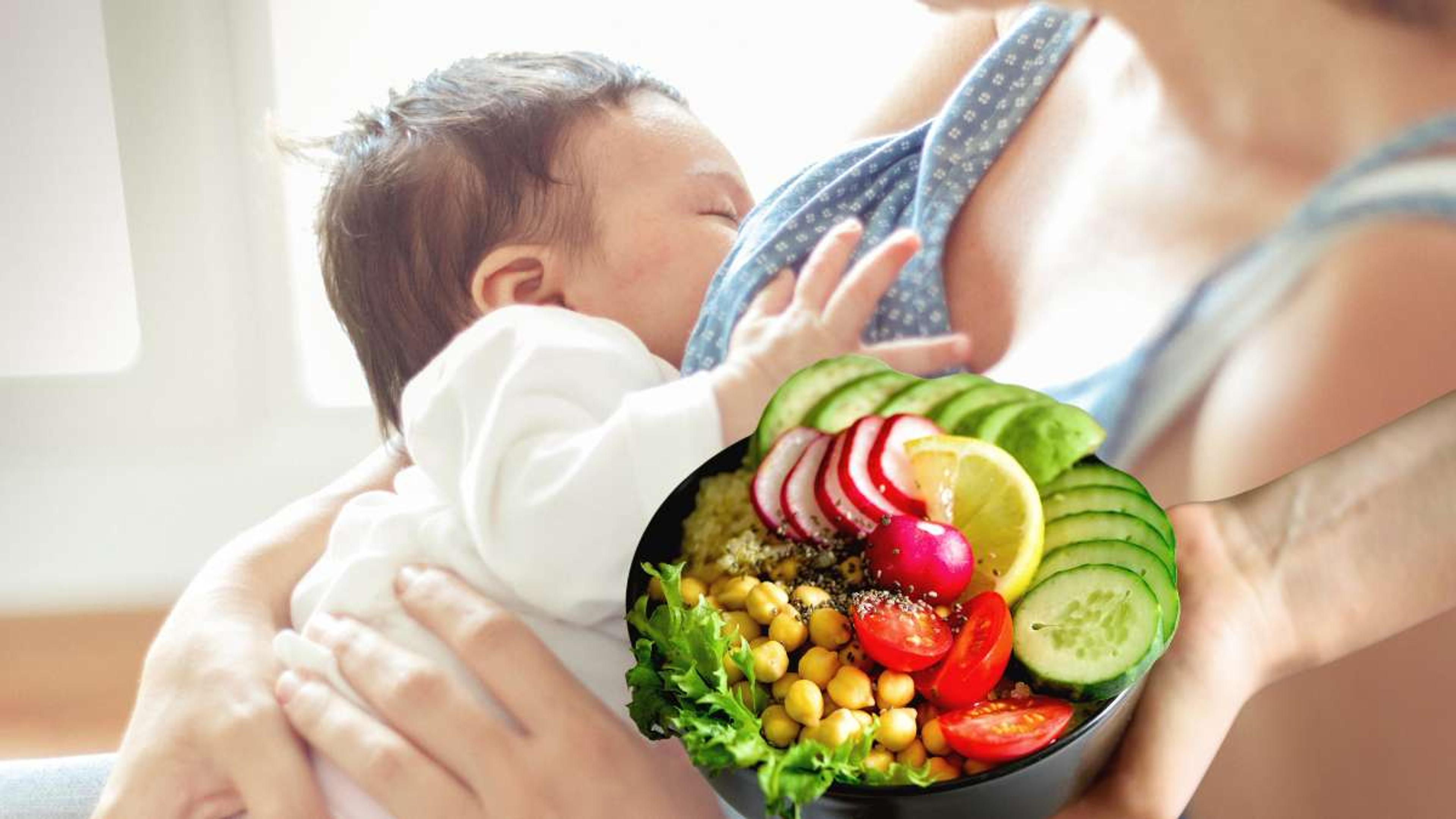Vegan Diet for Breastfeeding: Everything You Need to Know

- Key Takeaways
- Breastfeeding on a Vegan Diet
- Key Nutrients for Breastfeeding on a Vegan Diet
- Benefits of a Vegan Diet for Breastfeeding
- Addressing Concerns and Misconceptions
- Tips for Success on a Vegan Breastfeeding Diet
- Conclusion
- FAQs
Are you a breastfeeding mom who is also maintaining a vegan diet? You're not alone - numerous moms have successfully raised healthy babies on this plant-centric lifestyle. This article will provide crucial insights into the key nutrients required for successful breastfeeding while following a vegetarian diet, and how to ensure your baby gets all they need.
Ready to learn more about your vegan nursing journey? Let's dive in!
Key Takeaways
- Breast milk composition can be affected by a vegan diet, but studies show that it still provides essential nutrients like iodine, vitamin B-12, and omega-3 fatty acids.
- Vegan breastfeeding moms should focus on getting enough iron and protein from sources like beans, lentils, tofu, nuts, and seeds to support milk production for their babies.
- Omega-3 fatty acids are important for brain development in babies. Plant-based sources include ground flaxseeds, flaxseed oil, chia seeds walnuts, and hemp seeds.
- Calcium is necessary for both mom and baby. Leafy green vegetables like kale and spinach, tofu almond beans legumes fortified plant milks or juices are good calcium sources for vegans.
Breastfeeding on a Vegan Diet
The breastfeeding mother's vegan diet can affect the composition of her breast milk.

How diet affects breast milk composition
The food a mom eats can change her breast milk. For vegan moms, breast milk will have more of some things and less of others. Many studies look at how eating meat or not changes what is in the breast milk.
They found that with more plants and less meat, there was a change with iodine in the milk. A vegan diet can indeed impact the composition of a breastfeeding mother's breast milk. Numerous studies have delved into how dietary choices, particularly the exclusion of animal products, can influence the nutrients present in breast milk. One such nutrient that has garnered attention is iodine.
Research suggests that breast milk from vegan mothers may have lower levels of iodine compared to non-vegan counterparts. This disparity arises because iodine is commonly found in seafood and dairy products, which are typically excluded from a vegan diet. However, it is important to note that even with reduced levels, breast milk from vegan mothers still contains sufficient iodine to meet the needs of the baby. The difference lies in the concentration and may vary depending on the mother's individual dietary choices and supplementation practices.
To ensure an adequate intake of iodine, vegan mothers can consider incorporating iodine-rich foods into their diet. Sea vegetables such as nori, kelp, and dulse are excellent sources of iodine and can be easily included in various dishes. Additionally, using iodized salt in cooking or opting for iodine-fortified plant-based milks can help further boost iodine levels.
Other research has shown good news too. It found that when vegetarian or vegan moms eat vegetarian foods rich in vitamin B-12 and omega-3, it shows up in their breast milk.
Key Nutrients for Breastfeeding on a Vegan Diet
Protein sources, omega-3 fatty acids, calcium sources, iron sources, vitamin B12 and DHA supplementation are essential for breastfeeding on a vegan diet. Discover the best plant-based options for optimal nutrition while nursing your baby.
Read more to find out how to meet your nutritional needs as a vegan breastfeeding mom.

Protein sources
If you're breastfeeding on a vegan diet, you need more protein. High-protein foods help make lots of milk for your baby. There are plenty of plant-based foods that are packed with this nutrient. Here are some great sources of protein:
- Beans: They are rich in protein. You can use them in soups or salads.
- Lentils: These small legumes have lots of proteins too.
- Tofu and other soy products: These foods offer a lot of protein and other good nutrients like calcium and iron.
- Whole grains: Foods like oats and quinoa have a decent amount of protein.
- Nuts and Seeds: Almonds, chia seeds, and pumpkin seeds give you proteins along with healthy fats.
- Green veggies: Green leafy vegetables like broccoli, spinach and kale also carry protein.
Omega-3 fatty acids
Omega-3 fatty acids are very important in a vegan diet for breastfeeding moms. They help the baby's brain, eyes, and nerves to grow.
- Ground flaxseeds: These tiny seeds offer a good amount of omega-3 fats. You can sprinkling them on cereal or mix into a smoothie.
- Flaxseed oil: This oil is rich in omega-3s. You can use it in salad dressings or drizzle it over cooked veggies.
- Ground chia seeds: Chia seeds are great sources of omega-3s too. They're easy to add to food like oatmeal, smoothies, and baked goods.
- Walnuts: A handful of walnuts can provide lots of omega-3 fats. Eat raw walnuts as snacks or chop and sprinkle on salads.
- Hemp seeds: These small seeds also pack a punch with omega-3s. Add them to your yogurt, oatmeal or salad.
Calcium sources
Calcium is an essential nutrient for breastfeeding moms on a vegan diet. Here are some good sources of calcium:
- Leafy green vegetables like kale, spinach, and Swiss chard have high calcium absorption.
- Tofu is a great plant - based source of calcium.
- Almonds are another nutritious option for getting calcium.
- Beans, such as chickpeas and lentils, also provide calcium.
- Fortified plant milks and juices are available and can be a good source of calcium for vegans.
Iron sources
Iron is an important nutrient for breastfeeding moms on a vegan diet. Here are some good sources of iron that can help meet your needs:
- Beans: Including kidney beans, chickpeas, and lentils.
- Grains: Such as quinoa and oats.
- Nuts and seeds: Including pumpkin seeds and almonds.
- Green leafy vegetables: Like kale and spinach.
Vitamin B12 and DHA supplementation
Vitamin B12 and DHA are important nutrients for breastfeeding mothers on a vegan diet. Studies have shown that the milk of vegetarian and vegan mothers may have lower levels of these nutrients.
To ensure that both mom and baby get enough, it is recommended for vegan mothers to take vitamin B12 supplements during pregnancy and while breastfeeding. Low levels of vitamin B12 in breast milk have been linked to impaired brain development in babies.
Additionally, taking DHA supplements can help meet the needs for this essential omega-3 fatty acid. With proper supplementation, vegan mothers can provide their babies with all the necessary nutrients for healthy growth and development.
Other essential vitamins and minerals
Other essential vitamins and minerals that breastfeeding mothers on a vegan diet should pay attention to include:
- Vitamin A: Found in foods like sweet potatoes, carrots, kale, and spinach. It is important for your baby's vision and immune system.
- Vitamin C: Found in fruits like oranges, strawberries, and kiwi. It helps with iron absorption and supports the immune system.
- Vitamin E: Found in foods like almonds, sunflower seeds, and spinach. It acts as an antioxidant and supports cell function.
- Zinc: Found in foods like legumes, whole grains, nuts, and seeds. It helps with growth and development.
- Iodine: Found in iodized salt or seaweed. It is important for thyroid function.
- Folate: Found in foods like lentils, chickpeas, leafy greens, and fortified cereals. It supports cell division and prevents birth defects.
Benefits of a Vegan Diet for Breastfeeding
A vegan diet for breastfeeding offers a lower risk of chronic diseases, higher intake of fiber, antioxidants, and phytochemicals, as well as positive impacts on the environment and animal welfare.

Lower risk of chronic diseases
Following a vegan diet while breastfeeding can help lower the risk of chronic diseases for both you and your baby. Studies have shown that a well-balanced vegetarian or vegan diet can reduce the risk of cardiometabolic diseases like cardiovascular disease and type 2 diabetes.
By avoiding animal products and focusing on plant-based foods, you increase your intake of fiber, antioxidants, and phytochemicals that have protective effects against chronic diseases.
This means that not only are you providing optimal nutrition for yourself and your baby, but you're also taking steps to promote long-term health for both of you.
Higher intake of fiber, antioxidants, and phytochemicals
A vegan diet has the advantage of providing a higher intake of fiber, antioxidants, and phytochemicals. These substances are important for overall health and can have positive effects on breastfeeding mothers.
Fiber helps with digestion and prevents constipation, while antioxidants protect the body from damage caused by free radicals. Phytochemicals are compounds found in plants that have various health benefits, including reducing inflammation and preventing chronic diseases like heart disease and certain types of cancer.
By following a vegan diet rich in fruits, vegetables, whole grains, nuts, seeds, and legumes, breastfeeding mothers can ensure they are getting an abundant supply of these beneficial nutrients to support their own well-being as well as their baby's development.
Positive impact on the environment and animal welfare
Choosing a vegan diet can have a good effect on the environment and animals. Vegan diets are more environmentally friendly because they use fewer resources and produce fewer greenhouse gas emissions compared to diets that include meat.
By not consuming animal products, individuals can contribute to reducing deforestation, habitat destruction, and water consumption associated with animal agriculture. Additionally, going vegan supports animal welfare by eliminating the demand for products derived from animals.
Addressing Concerns and Misconceptions
Addressing concerns and misconceptions is important when discussing the vegan diet for breastfeeding.

Ensuring sufficient calorie intake
Breastfeeding mothers on a vegan diet need to make sure they are getting enough calories to support both their own needs and the needs of their baby. It is recommended that breastfeeding moms consume an additional 500 calories per day for exclusively breastfed babies.
This extra calorie intake helps provide the energy required for milk production and promotes optimal growth and development for the baby. By including nutrient-dense foods like whole grains, legumes, fruits, vegetables, nuts, and seeds in their diet, vegan mothers can ensure they meet their calorie needs while also receiving essential vitamins, minerals, and antioxidants necessary for overall health.
Remember: Consuming a variety of plant-based foods is key to ensuring adequate calorie intake and meeting nutritional requirements during breastfeeding.
Is breast milk vegan?
Breast milk is considered vegan because it is produced by a human and not an animal. Vegan mothers are sometimes asked if they plan to breastfeed, as there is a misconception that vegans avoid consuming any animal products, including human milk.
However, following a vegan lifestyle does not affect the vegan status of breast milk. It's important to note that the composition of breast milk can be influenced by a mother's dietary pattern and consumption of animal-origin foods.
But rest assured, breast milk from mothers who follow a vegan diet still contains sufficient levels of nutrients like vitamin B2 and carnitine.
Gassy baby concerns
Breastfed babies may sometimes experience gas, but it is not necessarily caused by a mother's vegan diet. Formula-fed babies tend to have more gas overall compared to breastfed babies.
The cause of gas in breastfed infants can be due to various factors, such as the baby swallowing air during feeding or an immature digestive system. It is important for parents to burp their baby frequently and try different breastfeeding positions to help alleviate gas discomfort.
If you have concerns about your baby's gassiness, consult with your pediatrician for guidance and support.
Safety of a plant-based or vegan diet while breastfeeding
A plant-based or vegan diet can be safe and healthy while breastfeeding. Breast milk from mothers on a vegan diet contains sufficient amounts of important nutrients like vitamin B2 and carnitine.
Research shows that breast milk produced by non-vegetarian, vegetarian, and vegan mothers is of comparable nutritional value. It's important to ensure you're getting enough calories, protein, and other necessary nutrients while breastfeeding, but a well-planned plant-based diet can provide all the nutrition needed for both you and your baby.
Seek guidance from a registered dietitian or healthcare provider to make sure you're meeting your nutritional needs.
Vegan diet and nutrient content in breast milk
Breast milk from vegan mothers has the same nutritional value as breast milk from non-vegetarian or vegetarian mothers. It provides all the necessary nutrients that a baby needs to grow and develop properly.
Vegan diets do not make breast milk non-vegan, and there is no evidence of breastfeeding babies having any negative health outcomes due to their mother's vegan diet. Breast milk from vegan mothers contains sufficient amounts of important nutrients like vitamin B2 and carnitine.
So, if you choose to follow a vegan diet while breastfeeding, you can be confident that your breast milk will provide your baby with all the nutrition they need for optimal health.
Research on vegan mothers producing breast milk of comparable nutritional value
Studies have shown that breast milk produced by vegan mothers is just as nutritious as milk from non-vegetarian or vegetarian mothers. In fact, research has found that the nutritional value of breast milk produced by vegan mothers is comparable in terms of essential nutrients such as vitamin B2 and carnitine.
This means that vegan mothers can confidently breastfeed their babies without worrying about their milk lacking important nutrients. So rest assured, if you're following a vegan diet while breastfeeding, your breast milk will provide all the necessary nutrition for your little one's growth and development.
Tips for Success on a Vegan Breastfeeding Diet
Plan your meals in advance and make sure to include a variety of nutrient-rich foods like tofu, lentils, whole grains, and leafy greens. Don't forget to properly supplement with vitamin B12 and DHA, and consult a registered dietitian or healthcare provider for guidance.
Feed both your body and baby with the best on a vegan breastfeeding diet. Read more for success tips!

Meal planning and Cooking methods for a vegan breastfeeding diet
Meal planning and cooking methods play a crucial role in ensuring that individuals following a vegan diet while breastfeeding receive the necessary nutrients for optimal health. Here are some tips to help you plan your meals and cook nutritious plant-based dishes:
- Include a variety of protein sources: Opt for plant-based proteins such as tofu, lentils, chickpeas, quinoa, and legumes. These foods provide essential amino acids necessary for your baby's growth and development.
- Incorporate omega-3 fatty acids: Include flaxseeds, chia seeds, hemp seeds, and walnuts in your meals for a good source of omega-3 fatty acids. These nutrients are important for brain development in infants.
- Ensure sufficient calcium intake: Consume foods rich in calcium, like fortified plant-based milk (such as soy or almond milk), tofu prepared with calcium sulfate, leafy greens (e.g., kale), and fortified orange juice.
- Choose iron-rich foods: Include iron sources such as beans, lentils, pumpkin seeds, dried fruits (like raisins and figs), spinach, and whole grains in your diet to meet your iron needs.
- Consider vitamin B12 supplementation: As vitamin B12 is primarily found in animal products, it is important to supplement this nutrient through either fortified foods or supplements to maintain adequate levels.
- Monitor vitamin D levels: Vitamin D absorption can be limited on a vegan diet; therefore, it may be necessary to have regular monitoring of vitamin D levels and consider supplementation if needed.
- Seek guidance from a registered dietitian or healthcare provider: A professional can help tailor meal plans according to your specific needs and ensure you are meeting all nutritional requirements during breastfeeding.
- Emphasize whole plant foods: Focus on consuming plenty of fruits, vegetables, whole grains, nuts, and seeds to obtain various vitamins, minerals, antioxidants, and fiber essential for overall well-being.
- Experiment with cooking methods: Try different methods like steaming, baking, sautéing, or grilling to cook your plant-based meals. This will help retain nutrients while adding flavor and variety to your dishes.
- Stay hydrated: Drink plenty of water throughout the day to stay properly hydrated, as it is important for milk production and overall health.
Proper supplementation and monitoring nutrient levels
Proper supplementation and monitoring of nutrient levels are important for success on a vegan breastfeeding diet. Here are some key points to remember:
- Talk to a healthcare provider or registered dietitian about appropriate supplements for a vegan breastfeeding diet.
- Vitamin B12 is crucial for both you and your baby's health. Consider taking a vitamin B12 supplement or eating fortified foods such as plant-based milks, breakfast cereals, and nutritional yeast.
- Omega-3 fatty acids, specifically DHA, play a vital role in brain development. Look for algae-based DHA supplements suitable for vegans.
- Monitoring calcium intake is essential since dairy products aren't part of a vegan diet. Include calcium-rich foods like tofu, leafy greens (such as kale), fortified plant-based milk alternatives, and almonds in your meals.
- Iron is important for energy and preventing anemia. Include iron-rich foods like lentils, chickpeas, quinoa, pumpkin seeds, figs, and dark leafy greens in your diet. Combining these with vitamin C-rich foods can enhance iron absorption.
- Vitamin D is crucial for bone health. Spend time outdoors to help your body produce vitamin D naturally or consider a supplement if needed.
- Keep track of other essential vitamins and minerals like zinc, iodine, choline, and folic acid to ensure adequate nutrition.
Seek guidance from a registered dietitian or healthcare provider
To ensure success on a vegan breastfeeding diet, it is important to seek guidance from a registered dietitian or healthcare provider. They can provide expert advice and support to help meet all your nutritional needs while breastfeeding.
A dietitian with experience in pediatrics can offer specialized guidance for vegan mothers, ensuring that you are consuming enough key nutrients like protein, omega-3 fatty acids, calcium, iron, and vitamin B12.
Additionally, consulting with a healthcare provider will help you determine the appropriate use of prenatal or other dietary supplements during lactation, ensuring optimal health for both you and your baby.
Listening to your body and baby's needs
To be successful on a vegan breastfeeding diet, it's important to listen to your body and your baby's needs. Pay attention to how you're feeling and make sure you're getting enough nutrients and calories to produce adequate breast milk.
Don't ignore any signs of hunger or fatigue, as these may indicate that you need to adjust your diet or increase your calorie intake. Additionally, observe how your baby is reacting to the breast milk.
If they seem satisfied and are gaining weight properly, then it's likely that they are getting all the necessary nutrients from your vegan diet. However, if you have any concerns about your baby's growth or development, consult with a healthcare provider or registered dietitian for guidance.
Remember, every mother-baby pair is different, so what works for others may not necessarily work for you and vice versa. Trust yourself and stay in tune with both your own body and the needs of your little one.
Conclusion
Breastfeeding on a vegan diet is not only possible, but it can also be healthy and beneficial for both the mom and baby. By ensuring sufficient intake of key nutrients like protein, omega-3 fatty acids, calcium, iron, vitamin B12, and DHA supplementation, vegan mothers can provide their babies with all the necessary nutrition they need.
With proper meal planning and guidance from a registered dietitian or healthcare provider, breastfeeding vegans can thrive and raise healthy babies while staying true to their values.
FAQs
1. Can I follow a vegan diet while breastfeeding?
Yes, you can follow a vegan diet while breastfeeding and still provide all the necessary nutrients for your baby's growth and development.
2. What foods should I include in my vegan diet to ensure sufficient nutrition during breastfeeding?
Include a variety of plant-based foods such as fruits, vegetables, whole grains, legumes, nuts, and seeds to ensure sufficient nutrition. It is also recommended to incorporate plant-based sources of protein like tofu, tempeh, beans, lentils, and quinoa.
3. Are there any nutrients that I may need to supplement on a vegan breastfeeding diet?
Yes, some nutrients that may require additional attention include vitamin B12, vitamin D (through sunlight exposure or supplements), omega-3 fatty acids (from algae-derived supplements), iron-rich foods paired with food high in Vitamin C for better absorption by the body.
4. Is it safe for my baby if I am following a vegan breastfeeding diet?
Yes it is safe for your baby if you are following a well-planned vegan breastfeeding diet that meets your nutritional needs. However consulting with a healthcare professional or registered dietician experienced in vegetarian/vegan nutrition can provide personalized guidance based on your specific circumstances.

